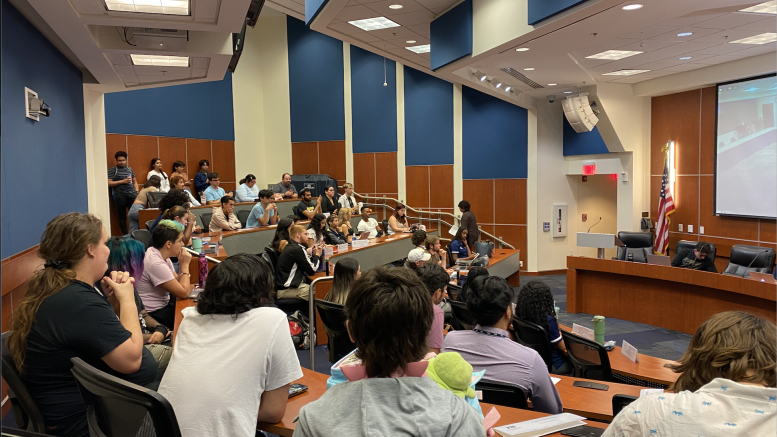Arianna Otero | News Director
After weeks of back-and-forth discussions, guest speakers and consistent pressure from student organizations, the senate passed a resolution on Mar. 13 denouncing house bill 999, which seeks to prohibit the funding of diversity, equity, and inclusion programs in universities.
The divisiveness provoked by this resolution is a symptom of an increasing intervention of state and national politics within the SGA chambers.
The “Can’t Ban Us” resolution was the primary focus of weeks of intense deliberation, in the end it would pass with 26 yays, eight nays, and three abstentions.
The resolution had initially died in the rules committee, with Chair Delano Cicconi citing that the bill claimed to reference multiple sources, all without a reference page or footnotes.
“Upon reviewing the version of the bill I was given it is evident that there are no sources, such as links, provided to support many of the statements made in the document,” said Cicconi. “For instance, it claims that FIU allocates 2% of its budget to DEI, but no sources are cited.”
Despite its apparent end, the bill would be brought back with a two-thirds vote following pushback from members of the Pride Student Union and Young Democratic Socialists of America.
In the weeks following, SGA would host multiple guest speakers both for and against the bill. Thematically, there was little intersection between the opposing perspectives.
Hugo Dorta, a speaker in opposition to the bill, focused strongly on the bill’s support for critical race theory.
“When I first read this bill I was taken aback because it was against my viewpoints and therefore should not represent the majority of our student body,” Dorta said. “The main purpose of Can’t Ban Us is critical race theory, which states people are either victims or oppressors. By saying this you’re breaking people down instead of building people up…this would set back our society.”
Critical race theory is defined as the critique of the effect of racial and gender blindness that is present in traditional legal and governmental structures, as stated by Harvard University.
On the other side of the issue stood Ness Cruz, newly elected housing senator, who read off some testimonies of students who had signed the petition in support of the resolution.
“The prompt was why do you think diversity, equity and inclusion initiatives, as well as critical race theory, should be taught here at FIU,” said the sophomore international relations major, explaining the parameters of the following responses.
One entry read: “Because people like me should be allowed to exist and should be allowed to tell our stories accurately.” Another read: “As a four-year university we as adults should not be shying away from topics such as critical race theory or women and gender studies.”
On top of students’ opinions, this resolution led to a strong division within SGA. Some key voices in the countless debates were CASE Senator Cicconi and bill sponsor and SIPA Senator Kaily LaChapelle
“I have many issues with the idea of critical race theory, I myself am someone that has brown skin, a colored person or a person of color whatever you want to call them, and no one is going to tell me that I am a victim,” Cicconi said. “This resolution is just something divisive, it’s really just trying to separate us.”
However, LaChapelle clarified some things for senators to get everyone on the same page.
“I hear a lot of people say that we’re indoctrinating our students to think a certain way, we’re all 18 plus, we go to college and enroll in our own classes. We decide what we want to enroll in,” said LaChapelle, vouching for their resolution. “If you aren’t listening to all of the people in this room, then you are not listening to your constituents.”





Be the first to comment on "SGA speaks out against current state legislation"